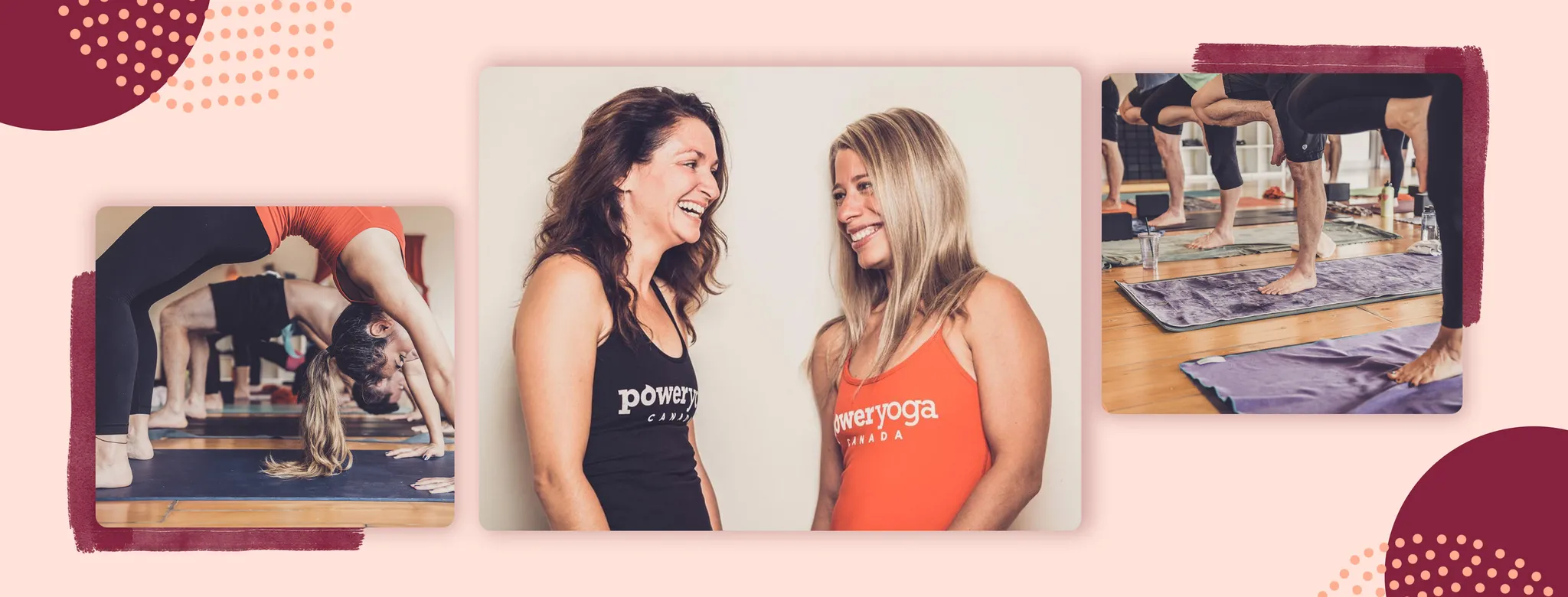Mindbody Customer Story
The Power of Pivoting: How PYC Turned the Unexpected Into Next-Level Growth

For everyone, everywhere, 2020 was a year of pivots. Plans changed, and business models shifted drastically. But for Power Yoga Canada (known as PYC), pivoting was nothing new. Years before the pandemic, PYC co-founder Pauline Caballero established the PIVOT concept: a methodology that helps people train their minds and develop habits that support them in ever-changing environments.
When March 2020 rolled around, Caballero was already in the final stages of publishing her first book, PIVOT: Five Practices to Strategize and Support You Through Change. The book explores the five main distinctions of the PIVOT concept—Perspective, Intuition, Vision, Obstacles, and Tactics—and how they help us thrive in a constant state of change. Because, pandemic or not, change is always present.
But for Caballero and her business partner, Kinndli McCollum, PIVOT is more than a concept. It's a mindset methodology that empowers new ways of thinking, living, and doing business. And it's the foundation of their business, which has successfully grown from one to 14 franchise locations since 2009. This is the story of how applying PIVOT helped build PYC—and kept it going strong through challenging times.
Where it all began
Like many great business partnerships, Caballero and McCollum connected through yoga. Caballero was working a corporate job when she discovered McCollum's power yoga classes and quickly fell in love with the practice.
Joined by their love of hot power yoga, Caballero and McCollum saw a gap in the market: there were no dedicated hot yoga studios in Toronto, Canada. So in 2009, they opened the first PYC location. Floor-to-ceiling curtains graced the room, trapping heat and creating an ambiance akin to a chic Manhattan loft. (Little did the co-founders know, the same curtains they picked up on a budget would later become a studio trademark.)
By defining a specific niche and intention, Caballero and McCollum experienced rapid and steady growth—so much that Caballero left her corporate job at the time to focus on scaling PYC.
"Our practice is hot power yoga—but our intention is really about empowering communities into action. All of our decisions originate from our intention: are we empowering people into action?" explains Caballero.
Building on its intention and mission, PYC has since expanded to include 14 franchise locations—all aligned around the shared goal to empower action. This commitment and intention played a large role in making PYC's business model and culture pandemic-proof.
Creating a pandemic-proof growth strategy
While change is inevitable, the PYC growth strategy was always intentional. Even before Caballero released her book, she led the PIVOT Accountability Coach Certification program through PYC. By employing PIVOT early-on, PYC successfully brought in the right affiliates to grow the brand—and keep it going strong through the pandemic.
"When we started offering teacher training, we were essentially creating our competition. That's what initiated the franchise," explains Caballero. "Now, we require all affiliate owners to complete the PIVOT program so that they have the tools and support to self-manage and achieve results."
In many ways, the PIVOT program manifests PYC's intention to empower communities into action. The methodology goes beyond yoga and creates accountability coaches who can empower people and communities anywhere.
"As moms ourselves, we want to empower other moms with the flexibility to raise their families outside of a 9 to 5 job. Our franchise model is all about empowering people to become business owners," says Caballero.
If you ask Caballero, communication is one of the biggest challenges and assets when growing a franchise. But if you commit to overcoming the challenges and stay true to your intention, your business will stand strong (even during a global pandemic).
Scaling from the ground up
With a background in corporate mergers, Caballero knew there was a huge opportunity to scale PYC as the first dedicated hot yoga studio in the Greater Toronto Area. But first, the business needed a sound back-end infrastructure to manage a multi-location client database. Enter Mindbody.
"We adopted Mindbody because we love how they educate business owners through programs like Mindbody University," says Caballero. "And the software allowed us to build the back-end of PYC easily. When we started adding multiple locations, Mindbody helped us scale with a centralized client database."
Now, Caballero and McCollum have set their sights on the next phase of growth: taking PYC global. In many ways, COVID-19 broke down geographical barriers and brought people together in new ways. As a result, PYC looks forward to expanding beyond Canada.
"We're in the process of rebranding Power Yoga Canada to Power Yoga Collective. This rebrand will make PYC accessible to more affiliates," shares Caballero. "People in Europe and the U.S. are interested in joining the network. Beyond the teacher training requirement, geography doesn't matter because we put people first. The only question is, 'do we have the right person?'"
The pandemic also accelerated the production of on-demand PYC classes. Although Caballero and McCollum already had plans to offer on-demand classes, the idea to launch poweryogaathome.com came to Caballero on March 13, 2020—around the time shelter-at-home orders spread worldwide.
"I was on my Peloton Bike and thought, 'I wonder if that URL is available," says Caballero. "And sure enough, it was—so I bought it."
Coming om: The future of studio yoga
Speaking of Peloton, COVID-19 sparked a massive turn to at-home fitness. Wellness enthusiasts have spent the last year curating their "home base" gyms. So what does this mean for the future of fitness and yoga studios?
Studio owners must ask, "how does the experience of working out alone at home compare to working out in connection with a community?" The answer will define the value each studio brings to the table as the industry reopens.
"There's going to be a trend of 'coming om'—a trend of coming back to the studio for connection," says Caballero. "People have a tremendous appetite for returning to the studio. They're looking for new things, which is a huge opportunity for business owners to create hybrid offers."
In fact, wellness is seeing new heights of popularity. And studios like PYC are seeing a surge of consumers turning to wellness since the start of the pandemic. On average, people who invested in wellness before COVID-19 weathered the storm better—from both a physical and mental health perspective. Meanwhile, people who didn't prioritize wellness began to realize the benefits. The bottom line: mind and body wellness is critical, especially during difficult times.
"Ultimately, our mission is to be for every body. People come to our classes because they want to do yoga, lose weight, and reduce stress," says Caballero. "But what they really get is a whole experience of how they show up in their life. Part of our philosophy is owning the guest experience from the moment you step inside—or the moment you join online."
Curious what's next for PYC? Caballero let us in on an exciting announcement: Power Yoga Collective recently signed a contract to write a book specifically about yoga methodology. Stay tuned for its release in spring 2022. In the meantime, tune into Caballero's podcast, Pivot Talks, to hear discussions about pivoting and navigating change as an entrepreneur.



